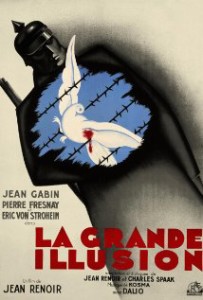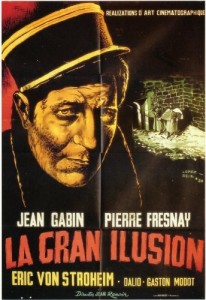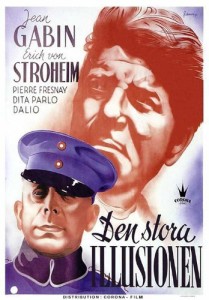La Grande Illusion [Grand Illusion] ***** (1937, Jean Gabin, Erich von Stroheim, Pierre Fresnay, Marcel Dalio, Dita Parlo, Julien Carette, Gaston Modot, Jean Dasté) – Classic Movie Review 2790
Co-writer/director Jean Renoir’s 1937 humanist and pacifist masterwork about two French officers being captured World War One is one of the great treasures of French and indeed world cinema. It is based on Renoir’s own wartime experiences as a POW. It was Oscar nominated as Best Picture in 1939, and the New York Film Critics voted it Best Foreign Language Film.
It is set mostly in two prison camps commanded by German aristocrat Captain von Raufenstein (Erich von Stroheim in neck brace, monocle and gloves), with the great Jean Gabin (worker prisoner Lieutenant Maréchal) and Pierre Fresnay (aristocrat prisoner Captain De Boeldieu) as the two Frenchmen in question and Marcel Dalio (wealthy Jewish prisoner Rosenthal) among the cross section of French prisoners they meet.
They are separated from Rosenthal before managing to escape but meet up again in a fortress commanded by Von Rauffenstein a few months later. De Boeldieu stars a friendship with Von Rauffenstein but Maréchal and Rosenthal plan to escape
[Spoiler alert] Fresnay’s De Boeldieu finally sacrifices himself in a grand gesture of loyalty to his comrades.
The gripping escape story is developed into a vividly expressive study in the tragedy of war and its effect on lives bound by country or class, with faultless work in every aspect. The co-writer of the scenario and dialogue is Charles Spaak and the cinematographers are the director’s nephew Claude Renoir and Christian Matras.
It also stars Dita Parlo, Julien Carette, Gaston Modot and Jean Dasté. Also in the cast are Georges Peclet, Sylvain Itkine, Jacques Becker and Werner Florian.
As the world headed relentlessly towards war, the film was banned at the time by Germany and Italy. It was exhibited in competition at the 1937 Venice Film Festival, where German pressure prevented it from winning the Best Film Golden Lion award, though apparently Mussolini approved of it, and Renoir did win the award for Best Overall Artistic Contribution. This prompted the French to found their own rival festival – the Cannes Film Festival – which soon after the war overtook Venice in importance.
It runs 117 minutes but the cut and dubbed US version runs 95 minutes.
© Derek Winnert 2015 Classic Movie Review 2790
Check out more reviews on http://derekwinnert.com











